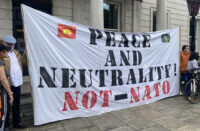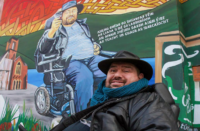As we enter 2023, working people are still affected by long-standing problems: shortage of housing, crumbling health service, low wages, precarious work, spiralling rents, and growing inequality.
Many of these conditions plague people in the Six Counties, with the added complication caused by British-imposed partition: sectarianism, a built-in unstable political system, overlaid with colonial rule from London, resulting in all major economic and social policies being directed from there.
The political institutions in Belfast continue to be mothballed and, since the re-establishment of “local” administration, have staggered and stumbled from one crisis to the next. The institutions established in Stormont were designed to manage expectations, to control any potential change to the needs and the strategy of the British state—regardless of which particular political party is in government in London.
At the end of 2022 a number of important actions were taken by workers in the Six Counties, which are to be welcomed. It’s important that workers stand up for their rights and assert their demands independently.
But they are caught in a difficult position. Their opinions will not carry much weight with the bean-counters in London. There are no real political vehicles functioning in Belfast. The impact of partition has been to make the working class vulnerable to the divide-and-rule tactic of both the capitalist class in the Six Counties and the British state when it suits their needs.
It fractured the northern section of our class and broke it away from the rest of the working class nationally, thereby making them powerless to effect any real change.
We cannot separate social or economic struggles from the real material context in which these struggles take place. We cannot ignore where real economic and political power resides: that is, in London.
At the end of 2022 the coalition government played its musical chairs, with Leo Varadkar replacing Micheál Martin as taoiseach, and Martin becoming both tánaiste and minister for foreign affairs. But while we had a rearrangement of the chairs around the Government table, the current strategy and its economic and social policies will remain firmly in place.
As in previous decades, each new minister will set up a review of ministerial priorities and come forward with a new plan or strategy for overcoming existing problems. Working people experience government by review committees, while the problems they face daily go unaddressed.
Establishment politicians act in the main as salesmen and women for the system. They are selling us capitalism, or a “better form” of capitalism. They offer the prospect of change, that a change in the existing order is possible if we just “stick with them.” They are selling us the illusion of change when in fact all remains the same. They are similar to the “snake-oil salesmen” in old films: their policies cure everyone’s problems, from the worker to the boss class; but in reality they are aimed at maintaining the system—a system built upon inequality and exploitation.
The Irish state has given priority to private health services over that of the public health service. They see the health service as a vehicle for pumping billions in public funds, through the HSE, into the private health businesses, thereby enriching a few individuals and shareholders.
They have likewise given priority to the private provision of shelter over the state’s responsibility to provide public housing at affordable rents. Housing waiting-lists grow daily, and the numbers of homeless reach new levels. It has been the policy of this state for many decades to promote private home ownership, to force people to take out massive loans from banks and other financial institutions, sowing the illusion that this is best for society and leads to stronger communities, which have a stake in society. This strategy includes demonising public housing and those who live in it.
It is the state’s primary function to create the best conditions for the creation and re-creation of capital (money). Workers have been denied rights in their work-place, the right to have their trade union recognised or to represent them collectively. Capital has all the rights, while labour is tied up in legal controls.
In foreign policy the Irish state will still be subservient to the interests of the United States and the European Union. It will continue to be a cheerleader for the NATO proxy war in Ukraine. It will continue to pursue a strategy of ever-closer alignment with the war strategies and military needs and spending of NATO and the EU.
We can be certain that 2023 will bring no real change unless working people organise themselves. But the power of real change lies in our hands. Our strength comes from our unity of purpose on common demands—demands that are transformative and have the potential to shift the balance of forces, to strengthen the hand of labour and weaken the power of capital.
These demands include:
• universal public housing at affordable rents
• a universal free public health service, from Derry to Kerry
• an all-Ireland Bill of Rights for workers
• enshrining in the Constitution of Ireland the people’s right to own our water
• an amendment to the Constitution enshrining military neutrality
• an independent, progressive foreign policy of pursuing global economic and social justice
• arguing for and pursuing the demand for nuclear disarmament and demilitarisation.






